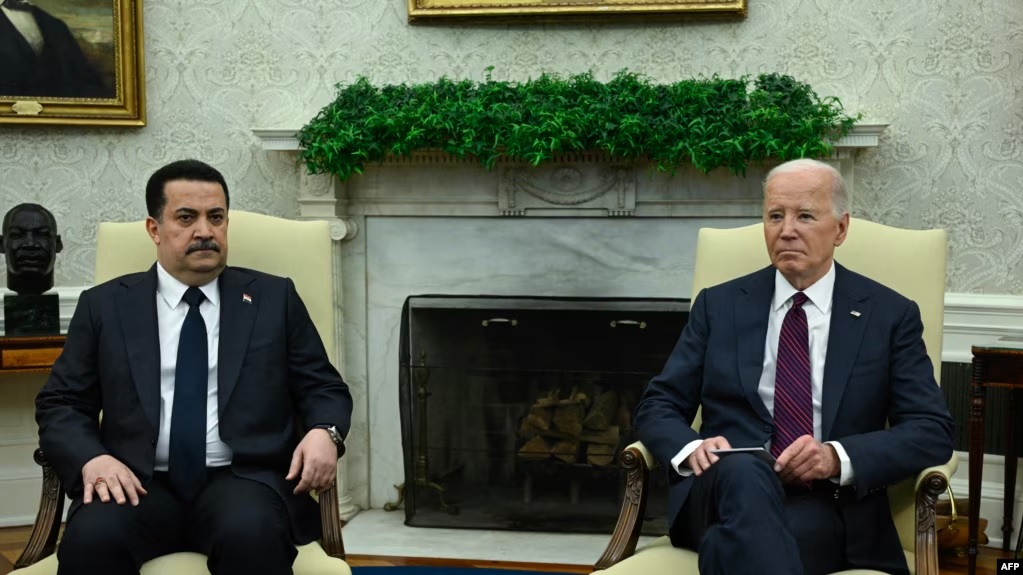Alwaght- 21 years after former Iraqi dictator Saddam Hussein's fall, the case of the withdrawal of the US forces from Iraq is still on the table of the current Prime Minister Mohammed Shia al-Sudani. He has been in the US over the past two days, and before his visit to Washington, in an article to the Foreign Policy magazine he talked about an agreement with the US for exit from Iraq.
The Iraqi Prime Minister wrote in this article that the US-Iraq Joint High Military Committee has agreed to end the international coalition mission according to a timetable. According to him, at the end of January, a high military committee consisting of senior Iraqi and American military officials was formed and reached an agreement regarding the gradual end of the international coalition's activities based on an agreed schedule. In this article, he emphasized that "all-round reduction of the escalation of tension in the Middle East requires an immediate end to the war in the Gaza Strip."
Al-Sudani's announcement of setting a timetable for the withdrawal of American forces from Iraq comes at a time when political parties and groups in this country insist on the immediate and unconditional withdrawal of American forces, but this withdrawal has not yet materialized.
Why is the US still in Iraq?
The US returned to Iraq in 2014 under the pretext of fighting ISIS, but its presence so far has not remarkably checked the terrorist group's activities. The New York Times earlier in a piece held that the presence of US troops won’t stop terrorist attacks from happening... American soldiers are likely to die in vain because, just as in Afghanistan, they have been given the impossible task of acting as an ephemeral thumb on the scale of a foreign country’s politics."
The piece continues that the US experiences in Afghanistan and Iraq made painfully clear that there is no magic number of American troops that can eradicate terrorism. The roughly 2,500 in Iraq certainly cannot. While Washington’s foreign policy establishment wrings its hands about the risks of leaving, it appears to be ignoring the clear costs of staying.
What's behind occupation of Iraq?
Some active American groups and lobbies argue that it is very important to collect information about terrorist groups such as ISIS and Al-Qaeda and to prevent the enemy of the US in Iraq from filling the void caused by American military withdrawal— the same reasonings that were raised about Afghanistan. But the truth is that the American presence has fomented insurgencies in Iraq. Al-Qaeda and later ISIS were able to use their achievements against the government and the resulting chaos, and now the Iraqi government, relying on its local and internal power, has been able to restore relative order and security to this country. Therefore, it seems that more than the fight against terrorism, the Americans are worried that after exit, their place in Iraq will be filled by their opponents. That is why Washington insists on staying in Iraq despite the heavy costs.
Costs of staying in Iraq for the US
American airstrikes in Iraq have played an important role in escalating tensions between Baghdad and Washington. Meanwhile, Public Mobilization Forces, a voluntary force formed in 2014 in opposition to ISIS, can carry out large-scale attacks on American bases in the region in retaliation for these attacks. Therefore, it seems that if the US insists on staying in Iraq, the tensions between Washington and Baghdad will be inflamed. These political tensions are the most expensive political cost of the continued US presence in Iraq.
So, it is said that a major part of the Iraqi PM's talks in Washington revolves around the future of presence or exit of the Americans. This is the first visit to the US of PM al-Sudani since he assumed the office in October 2022, and it seems that he is resolved to determine the status of the US presence in his country.
The Iraqi PM is on the one hand under pressure of his allies like Iran that has repeatedly insisted on US expulsion and localization of protection of Iraq security and sovereignty. So, al-Sudani will press the US to pull out as a response to the Iranian pressures.
From another perspective, inside Iraq, there are major opposition to the American presence, and continuation of this presence has already caused instability and chaos. Resistance forces, including the PMF, which are part of the regular armed forces body, have emphasized on carrying on their attacks on the US troops if they decline to exit. These attacks have made the PM concerned, and to stop them, he seeks to press the US for permanent withdrawal from the country.



























